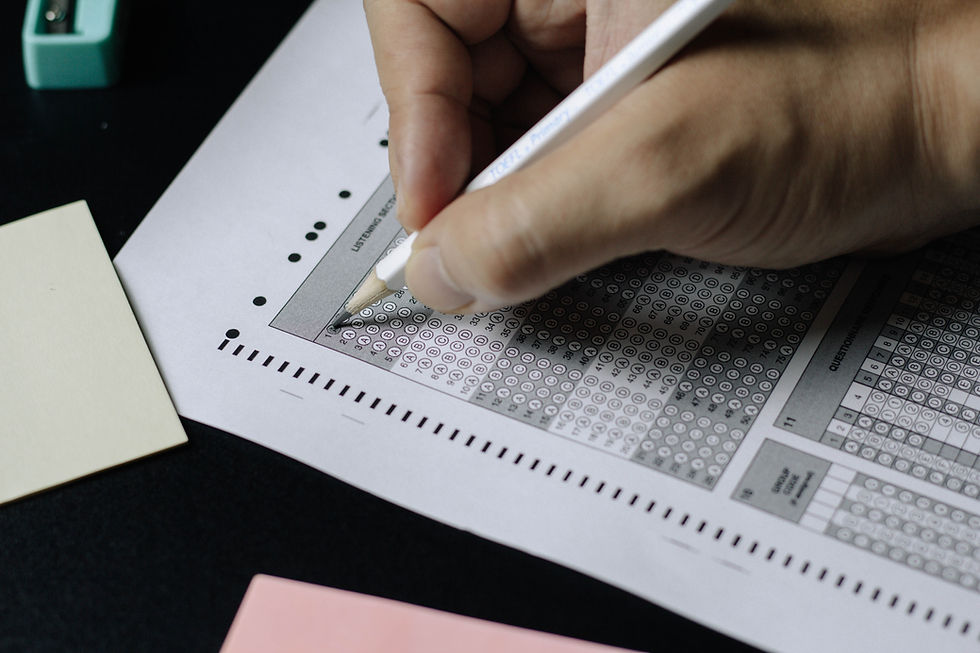Exams: A Necessary Step to Reach Your Goals
- Shreya Giri
- Aug 1, 2023
- 3 min read
Examinations have long been an integral part of the education system, serving as a fundamental tool to evaluate a student's academic progress and knowledge retention. It is essential to recognize the crucial role exams play in shaping the overall educational experience and preparing students for the challenges of the future.
In this article, we will explore the reasons why exams are important for students and how they contribute to their personal and intellectual growth.

Assessing Learning and Knowledge Retention
At its core, the primary purpose of exams is to assess a student's understanding of the subject matter and their ability to apply what they have learned. Regular assessments allow educators to gauge the effectiveness of their teaching methods and identify areas where students may be struggling.
By assessing learning outcomes, exams provide valuable insights into the overall effectiveness of the educational curriculum, helping educators make necessary adjustments to enhance the learning experience.
Encouraging Active Learning and Preparation
The prospect of exams motivates students to engage in active learning and preparation. Knowing that they will be evaluated on their knowledge and skills pushes students to stay attentive in class, participate actively, take notes, and study regularly.
This level of engagement fosters a deeper understanding of the subject matter and cultivates a sense of discipline and responsibility in students, skills that are vital for success in both academia and the professional world.
Developing Time Management Skills
Exams come with deadlines, and students must learn to manage their time effectively to cover the entire syllabus and review adequately. The process of preparing for exams instills valuable time management skills, teaching students how to prioritize tasks, set achievable goals, and allocate their time efficiently.
These skills are not only essential for academic success but also serve as a foundation for future career endeavors, where time management can significantly impact performance and productivity.

Enhancing Problem-Solving and Critical Thinking Abilities
Examinations often present students with challenging questions that require critical thinking and problem-solving abilities. By tackling these questions, students develop their analytical skills, learn to think logically, and cultivate creativity in finding solutions.
These cognitive abilities are essential for facing real-life challenges, as they enable individuals to approach problems with a structured and rational mindset, making them more adaptable and resilient in various situations.
Building Resilience and Coping with Pressure
Exams can be stressful, and facing academic pressure is a part of the educational journey. However, this pressure also presents an opportunity for students to build resilience and cope with stress.
Learning to manage exam-related stress helps students develop emotional intelligence, self-awareness, and coping mechanisms. These attributes are vital not only in academics but also in handling stress and pressure in their personal and professional lives.
Fostering Healthy Competition
Exams foster healthy competition among students, pushing them to strive for excellence and achieve their full potential. Healthy competition encourages students to set higher standards for themselves and seek continuous improvement.
It also helps identify high achievers, who can serve as role models for their peers, inspiring others to work harder and excel academically.
Preparing for Real-Life Challenges
Life is filled with challenges that require problem-solving, decision-making, and perseverance. Exams, in a way, simulate these real-life challenges by testing a student's knowledge, critical thinking abilities, and ability to perform under pressure.
By preparing for exams and facing academic challenges, students develop the skills necessary to navigate the complexities of life with confidence and determination.
Providing Feedback for Improvement
Exams offer valuable feedback to both students and educators. For students, exams identify their strengths and weaknesses, enabling them to focus on areas that require improvement.
For educators, exam results provide insights into the effectiveness of their teaching methods and curriculum, allowing them to refine their approach to better meet the needs of their students.

Conclusion
Examinations are an essential aspect of the education system, serving multiple purposes that contribute to a student's personal and intellectual growth. From assessing learning and knowledge retention to fostering problem-solving skills and resilience, exams play a vital role in preparing students for the challenges that lie ahead.
It is crucial to recognize the significance of exams in shaping well-rounded and capable individuals who are ready to face the complexities of the world. By understanding the value of exams, we can work towards creating a balanced and effective education system that empowers students to reach their full potential.

About the Author
Shreya Giri is a talented SEO content writer with a unique flair for captivating readers. With a bachelor's degree in geography, her passion for crafting exceptional content shines through in every word she writes. Shreya's expertise lies in her ability to seamlessly blend language and storytelling, effortlessly capturing the attention of her audience.
She is currently pursuing a Master's degree in geography and has a remarkable talent for transforming intricate concepts into captivating narratives that have a lasting impact. With Shreya, you can expect excellent, captivating content that will keep you engaged from beginning to end.
You can connect with her through-
My-Lekh profile- lekh.com/profile/shreyagiri06/profile LinkedIn profile- https://www.linkedin.com/in/shreya-giri-a0a607265
Email- shreyagiri06@gmail.com

Comments